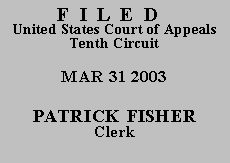

| WILLIAM LAWSON ROSS, III,
Plaintiff - Appellee, Defendants - Appellants. |
No. 02-6147
(D.C. No. CIV-01-994-H) |
Plaintiff William Lawson Ross, III was injured while incarcerated in the Beckham County Jail. He brought an action in district court claiming, inter alia, that defendants violated the Eighth Amendment by their failure to protect him while he was in their custody. After substantial discovery had been completed, defendants filed motions for summary judgments contending that no genuine issue of material fact exists, entitling them to judgment as a matter of law. The district court granted defendants' motions as to two claims, but denied the motions with respect to Ross' claim for failure to protect and for punitive damages, and denied qualified immunity to the sheriff.
As a general rule, appellate courts have jurisdiction to hear appeals only from "final decisions" of district courts. 28 U.S.C. § 1291. Nevertheless, the Supreme Court held in Mitchell v. Forsyth, 472 U.S. 511, 528-30 (1985), that a district court's order denying a defendant's motion for summary judgment was an immediately appealable "collateral order" under Cohen v. Beneficial Industrial Loan Corp., 337 U.S. 541 (1949), where (1) the defendant was a public official asserting a defense of "qualified immunity," and (2) the issue appealed concerned not which facts the parties might be able to prove, but whether certain given facts showed a violation of "clearly established" law. See also Harlow v. Fitzgerald, 457 U.S. 800, 818 (1982) (public officials entitled to "qualified immunity" from "liability for civil damages insofar as their conduct does not violate clearly established . . . rights of which a reasonable person would have known").
Interlocutory appeals are the exception, not the rule. The Supreme Court determined in Johnson v. Jones, 515 U.S. 304, 313 (1995), that a denial of qualified immunity is not appealable when it "determines only a question of 'evidence sufficiency,' i.e., which facts a party may, or may not, be able to prove at trial." The Court stated that "the District Court's determination that the summary judgment record in this case raised a genuine issue of fact concerning petitioners' involvement in the alleged beating of respondent was not a 'final decision' within the meaning of the relevant statute." Id. Thus, to the extent the denial of qualified immunity turns on issues of fact, as opposed to issues of law, it is not appropriate for interlocutory appeal.
"The doctrine of qualified immunity shields individual government officials performing discretionary functions 'from liability for civil damages insofar as their conduct does not violate clearly established statutory or constitutional rights of which a reasonable person would have known.'" Butler v. City of Prairie Vill., Kansas, 172 F.3d 736, 745 (10th Cir. 1999) (citing Tonkovich v. Kansas Bd. of Regents, 159 F.3d 504, 516 (10th Cir. 1998) (citations omitted); Gehl Group v. Koby, 63 F.3d 1528, 1533 (10th Cir. 1995)). While a governmental entity cannot absolutely guarantee the safety of all inmates, such entities have a constitutional duty under the Eighth Amendment to take reasonable steps to protect a prisoner's safety and bodily integrity. Berry v. City of Muskogee, Oklahoma, 900 F.2d 1489, 1499 (10th Cir. 1990). See also Farmer v. Brennan, 511 U.S. 825, 832-34 (1994). In order to succeed on his claim here, Mr. Ross was required to present evidence that he was incarcerated under conditions which posed a substantial risk of serious harm. Grimsley v. MacKay, 93 F.3d 676, 681 (10th Cir. 1996) (citing Farmer, 511 U.S. 834). He was also required to present evidence regarding the sheriff's state of mind, otherwise referred to as a deliberate indifference. Id.
The district court held that
[a]lthough a close question, . . . the plaintiff produced sufficient evidence both that the conditions of the Beckham County Jail, including its failure to adhere to the jail standards of the Oklahoma State Department of Health resulted in a substantial risk of harm to the prisoners and that the Sheriff was aware of the danger resulting from inadequate supervision, but failed to take reasonable steps to insure the prisoners' safety.
Dist. Ct. Order at 6 (footnote omitted). As noted by the Supreme Court in Johnson, questions of sufficiency of the evidence to raise a genuine issue of fact regarding a defendant's liability are inappropriate for interlocutory appeal. Having heard oral argument and reviewed the record, we are persuaded that material fact issues remain regarding whether plaintiff's incarceration posed a substantial risk of harm, as well as to whether the sheriff was deliberately indifferent to that harm. Thus, we do not have jurisdiction to review the appeal of the denial of qualified immunity.(1) Accordingly, we DISMISS the appeal.
ENTERED FOR THE COURT
Stephanie K. Seymour
Circuit Judge
*.This order and judgment is not binding precedent, except under the doctrines of law of the case, res judicata, and collateral estoppel. The court generally disfavors the citation of orders and judgments; nevertheless, an order and judgment may be cited under the terms and conditions of 10th Cir. R. 36.3.
1. Because we have determined that we lack jurisdiction over the qualified immunity issue, we do not decide whether pendent appellate jurisdiction would have been appropriate for consideration of defendants' remaining claims.